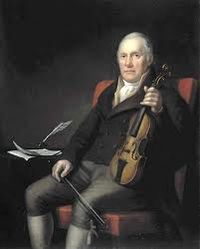Annotation:Marchioness of Tweeddale (1) (The)
Back to Marchioness of Tweeddale (1) (The)
MARCHIONESS OF TWEEDDALE, THE. Scottish, March (?). E Flat Major. Standard tuning (fiddle). AB. Composed by William Marshall (1748-1833).

A Scottish fiddler and composer, Marshall is most famous for his many fine strathspeys. The composer worked for much of his life for Alexander, the 4th Duke of Gordon as the Steward of his Household, and it is fortunate that the Duke was an enthusiastic supporter and patron of Marshall's music. Tweeddale is in Berwick on Tweed. The Marchioness for whom Marshall composed his melody was Lady Susan Montagu (1797-1870), the 2nd daughter of Lady Susan Gordon of Gordon castle and William Montagu, thus she was the 4th Duke of Gordon's (Marshall's employer) grand-daughter. She married George Hay, 8th Marquis of Tweeddale (an aide-de-camp to Wellington in the Peninsular War, later a general in the army) at Huntly Lodge in March, 1816. Charles Samuel Stewart (Sketches of Society in Great Britain and Ireland, 1834) flatteringly said of her:
Lady Tweeddale, who previous to her marriage was Lady Susan Montague, a daughter of the Duke of Manchester, is fine looking, both in face and figure, and of sedate and dignified manners, blended with much feminine grace and sweetness. Though the mother of ten children, she appears scarce more than twenty-five or twenty-eight years of age...
The Gow's dedicated their Third Collection of Niel Gow's Reels (1792) to the previous Marchioness of Tweeddale. The Marchioness at that time was Lady Hannah Maitland, who had married George Hay, 7th Marquess of Tweeddale (1753-1804) in 1785. The couple had eleven children. Their end was unfortunate, as they had traveled to the Continent for the Marquess' health during a lull in the Napoleonic wars and were caught in France when conflict resumed in 1803. They were imprisoned in the fortress at Verdun, where the Marchioness died in May, 1804, followed soon after in death by her husband. See also note for "Marquis of Tweeddale's Reel (The)"
Source for notated version:
Printed sources: Marshall, Fiddlecase Edition, 1978; 1822 Collection, p. 23.
Recorded sources:
